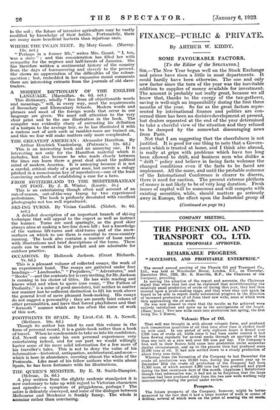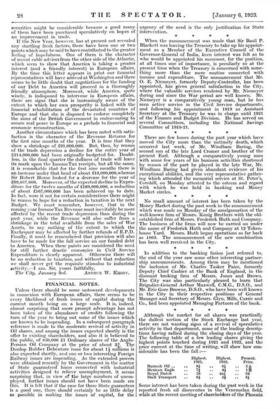FINANCE-PUBLIC & PRIVATE.
By ARTHUR W. KIDDY.
SOME FAVOURABLE FACTORS.
[To the Editor of the SPECTATOR.] SIR,—The New Year began well on the Stock Exchange and prices have risen a little in most departments. It could hardly have been otherwise. The one and only new factor since the turn of the year was the inevitable addition to supplies of money available for investment The amount is probably not really great, because we all know that, thanks to the energy of the tax-gatherer, saving is well-nigh an impossibility during the first three months of the year. So far as the great factors repre- sented by international finance and politics are con- cerned there has been no decisive development at present, but dealers separated at the end of the year determined to take a cheerful view of the situation and they refused to be damped by the somewhat discouraging news from Paris.
Not that I am suggesting that the cheerfulness is not justified. It is good for one thing to note that a Govern- ment which is trusted at home, and I think also abroad, is really at grips with problems which have too long been allowed to drift, and business men who dislike a " drift " policy and believe in facing facts welcome the changed conditions even if the facts to be faced are unpleasant. All the same, and until the probable outcome of the International Conference is clearer to discern, there is need for caution. The present extreme plethora of money is not likely to be of very long duration. Fresh issues of capital will be numerous and will compete with existing securities, while, should matters go seriously awry in Europe, the effect upon the Industrial group of (Continued on page 28.) securities might be considerable because a good many of them have been purchased speculatively on hopes of an improvement in trade. If the New Year, however, has at present not revealed any startling fresh factors, there have been one or two points which may be said to have contributed to the greater feeling of hopefulness. One of them is the character of recent cable advices from the other side of the Atlantic, which seem to show that America is taking a greater interest (and a friendly interest) in European affairs. By the time this letter appears in print our financial representatives will have arrived at Washington and there seems to be little doubt that negotiations for the funding of our Debt to America will proceed in a thoroughly friendly atmosphere. Moreover, while America, quite wisely, is indisposed to intervene in European affairs, there are signs that she is increasingly aware of the extent to which her own prosperity is linked with the financial rehabilitation of the devastated countries of Europe and that she is disposed to endorse completely the aims of the British Government in endeavouring to secure real peace in Europe as a prelude to financial and economic reconstruction.
Another circumstance which has been noted with satis- faction is the character of the Revenue Returns for the first nine months of the year. It is true that they show a shrinkage of £91,000,000. But, then, by reason of the trade depression a decline for the entire year of £214,000,000 had been originally budgeted for. Doubt- less, in the final quarter the dullness of trade will leave its mark upon the IncomeTax receipts, but all the same, it is remarkable that for the first nine months there is an increase under that head of about £18,000,000,whereas Sir Robert Home looked for a decrease for the year of £69,887,000. Moreover, of the expected decline in Expen- diture for the twelve months of £169,000,000, a reduction of about £167,000,000 has been achieved up to date. In fact, were it not for certain considerations there might be reason to hope for a reduction in taxation in the next Budget. We must remember, however, that in the coming year Income Tax Revenue must inevitably be more affected by the recent trade depression than during the past year, while the Revenue will also suffer from a shrinkage in the total available from the sales of War Assets, to say nothing of the extent to which the Exchequer may be affected by further refunds of E.P.D. Finally, it must be remembered that provision will also have to be made for the full service on our funded debt to America. When these points are considered the need for still further drastic economies in Civil Service Expenditure is clearly apparent.. Otherwise there will be no reduction in taxation, and without that reduction we shall never get the requisite stimulus to industrial activity.—I am, Sir, yours faithfully,



















































 Previous page
Previous page